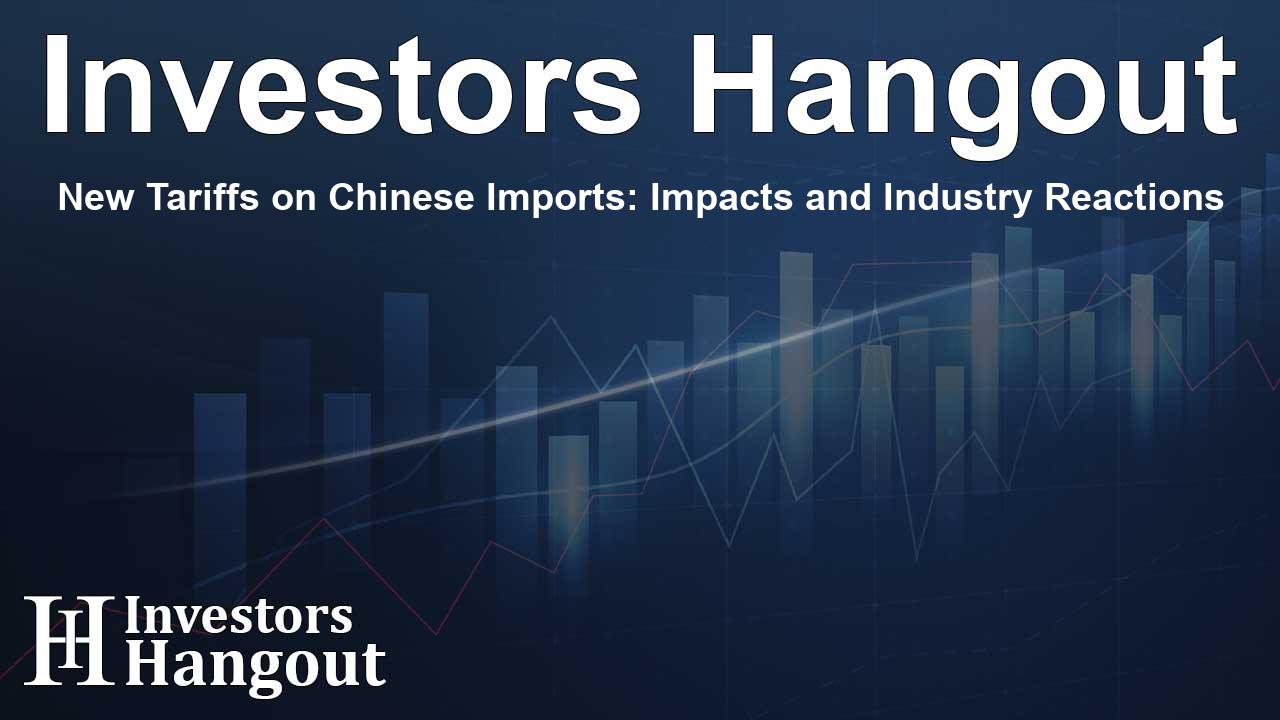New Tariffs on Chinese Imports: Impacts and Industry Reactions

Recent Tariff Increases on Chinese Goods
The Biden administration has recently finalized significant tariff increases on a variety of Chinese imports, aimed at strengthening the protection of vital American industries. Among the most notable changes is a staggering 100% tariff on electric vehicles imported from China, a step designed to bolster domestic manufacturers against a competitive landscape heavily influenced by state subsidies in China.
Details of the Tariffs Implemented
The U.S. Trade Representative announced that these tariff increases will be officially implemented, including a 50% duty on solar cells and a 25% duty on key metals like steel and aluminum. This move is part of a broader strategy to address what the administration perceives as unfair trade practices and to counteract the dominance of Chinese manufacturers in critical sectors.
Timeline for Tariff Implementation
The tariffs are not just immediate; some of them, such as the 50% duty on new semiconductor categories, are scheduled to take effect in 2025. Additionally, a new 25% tariff on lithium-ion batteries, essential for electric vehicles, will also be enforced. The strategy reflects a long-term approach to reevaluating trade relationships with China.
Impact on American Industries
Despite the intentions behind these tariffs, industry leaders are expressing concerns about potential disruptions in the supply chain. For instance, semiconductor companies are warning that the increases could exacerbate existing shortages and lead to higher prices for consumers and businesses alike.
Industry Responses to Tariff Increases
Many within the technology and automotive sectors are voicing their frustrations. Jason Oxman, president of the Information Technology Industry Council, pointed out that tariffs have already cost American businesses and consumers an astronomical $221 billion without producing any significant shifts in Chinese trade policy.
Call for Revisions
Manufacturers reliant on specific materials from China, such as graphite and critical minerals used in electric vehicle production, are advocating for reassessment of these tariffs. They argue that a reliance on Chinese imports cannot be easily dismantled without significant consequences to production capabilities.
Government Officials' Standpoint
From the government’s perspective, these tariffs are not merely punitive actions but strategic moves to reshape supply chains. Lael Brainard, a leading economic adviser, emphasizes that these measures are necessary to ensure U.S. industries can compete fairly, particularly in the electric vehicle market.
The Bigger Picture
There’s a broader context to these tariff increases, especially as they occur alongside an ongoing global conversation about industrial policy and competition. Brainard noted that protecting the U.S. electric vehicle sector is not just about tariffs but involves substantial investments in domestic industries.
International Implications and Responses
These tariffs are sending ripples through international markets. China's government has reacted, stating that the U.S. approach is rooted in unilateralism. They contend that the tariffs will not only backfire but also fail to address the underlying challenges in U.S. industries.
Global Responses to the Tariffs
In response to the U.S. tariffs, both the European Union and Canada have initiated similar measures against Chinese electric vehicles, highlighting a growing consensus among allied nations about addressing perceived inequities in trade.
Considerations for U.S. Industries
The newly instituted tariffs come with particular exemptions and adjustments that might benefit specific sectors. For example, U.S. port operators have gained some respite from a planned 25% tariff on cranes, which China predominates. The USTR has allowed for exclusions of certain cranes that were ordered before the initial tariff announcement.
Temporary Measures Amid Tariff Hikes
There are also temporary loopholes for medical supplies like face masks and surgical gloves, as the U.S. aims to shift towards non-Chinese suppliers in these critical areas. Additionally, certain categories of industrial machinery will be considered for tariff exclusions, showcasing a targeted approach to tariff implementation.
Frequently Asked Questions
What new tariffs have been implemented?
The Biden administration has finalized tariffs on Chinese imports, including a 100% tariff on electric vehicles and 50% on solar cells and other goods.
How are American industries reacting to the tariff increases?
Many industries are concerned these tariffs may disrupt supply chains and increase costs for consumers, particularly in technology and automotive sectors.
What is the government's justification for these tariffs?
The government argues that the tariffs are necessary to protect American industries from unfair competition and state-driven advantages in China.
Are there exemptions to the new tariffs?
Yes, there are temporary exclusions for certain medical supplies and provisions for specific machinery categories.
How might these tariffs affect future trade relations?
These tariffs could lead to escalating tensions in U.S.-China trade relations, with potential retaliatory measures from China and impacts on global supply chains.
About The Author
Contact Henry Turner privately here. Or send an email with ATTN: Henry Turner as the subject to contact@investorshangout.com.
About Investors Hangout
Investors Hangout is a leading online stock forum for financial discussion and learning, offering a wide range of free tools and resources. It draws in traders of all levels, who exchange market knowledge, investigate trading tactics, and keep an eye on industry developments in real time. Featuring financial articles, stock message boards, quotes, charts, company profiles, and live news updates. Through cooperative learning and a wealth of informational resources, it helps users from novices creating their first portfolios to experts honing their techniques. Join Investors Hangout today: https://investorshangout.com/
The content of this article is based on factual, publicly available information and does not represent legal, financial, or investment advice. Investors Hangout does not offer financial advice, and the author is not a licensed financial advisor. Consult a qualified advisor before making any financial or investment decisions based on this article. This article should not be considered advice to purchase, sell, or hold any securities or other investments. If any of the material provided here is inaccurate, please contact us for corrections.
